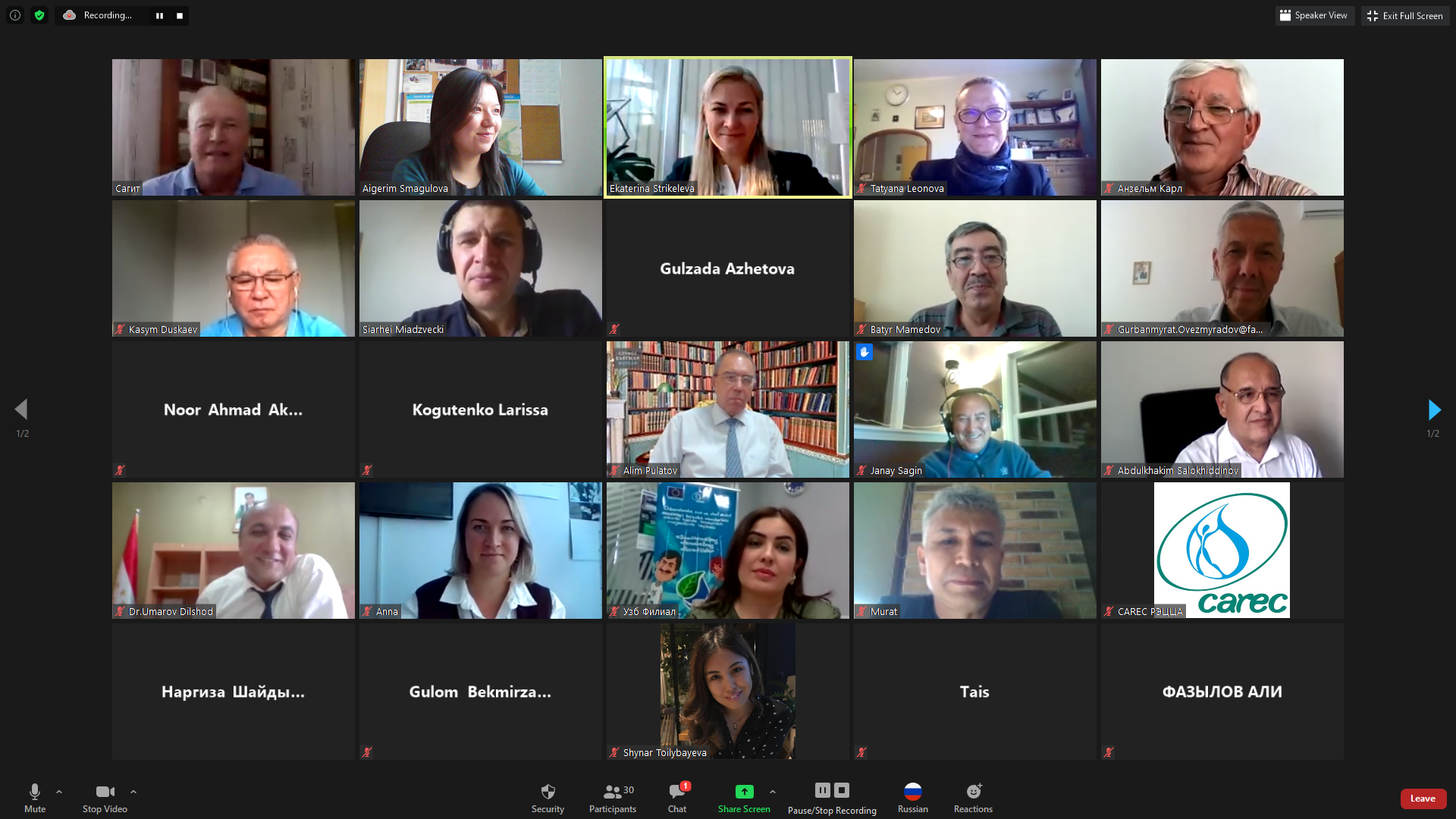
#SmartWatersGrandFinale
#SmartWaters_Events
ALMATY, September 10, 2020
In continuation of the events dedicated to the end of the 5-years long “Smart Waters” project, implemented by CAREC with funding from the United States Agency for International Development (USAID), a second online-conference was held. The main invited guests were the members of the Network of Academic Communities - professors and researchers from leading universities, as well as specialists from capacity building training centers of Central Asian countries and Afghanistan. In addition to the representatives of the academic community, national and international partners, as well as water experts joined the meeting, with a total number of 48 participants at that day.
The Network of Academic Communities (NAC) was formed in 2012 and in 2015 Smart Waters project supported it within the framework of the 2nd component "Networking and Cooperation".
Over the past 5 years, the members of the Network have repeatedly gathered together, discussing the implementation of joint initiatives and the development of systematic approaches required for the formation of regional academic platform. And every time new participants would appear willing to contribute to the development of the educational sector in areas such as water management, climate change and environmental protection. Thus, the active participation of academic specialists has led to its significant expansion, and today more than 30 universities and training centers of Central Asia and Afghanistan are the members of NAC.
The following meeting was organized as part of the Grand Finale marathon of Smart Waters project. The purpose of the meeting was to demonstrate a five yearlong path of cooperation enhancement between academia representatives, to share experience of partner organizations in the development of academia, and to jointly discuss possible methods of its sustainability.

The progress, which was achieved within the framework of 2nd Component implementation for the period of 2019-2020, was presented to the participants. In particular, a training course for undergraduate students named "Basin planning and water resources management" was developed, and an Integrated Water Resources Management (IWRM) laboratory with a working model of Chirchik river basin was built at the Tashkent Institute of Irrigation and Agricultural Mechanization Engineers (TIIAME).
According to the project experts, the prepared educational material can be furtherly used both by scientists and teachers as well as wide range of specialists interested in the issues of water resources rational use and its sustainable management in Central Asia. As for the laboratory, it is considered to be unique for the entire region. The existence of such a laboratory can make a valuable contribution to the promotion of IWRM principles through its application in the educational processes of the institute and its introduction to capacity-building training courses for employees of water management organizations not only in Uzbekistan, but also for the specialists from other CA countries.
As for the sustainability, participants shared an opinion that for its achievement the demonstration of all the experience gained within the framework of Network's activity at a higher country level of the region is required. Consequently, the progress achieved will become more localized and will encourage decision-makers to introduce proposals into the existing education systems.
Also it was highlighted that the views of today's young professionals who participated in the session were identical to the vision of more qualified professors, members of the Network, and it was noted that all participants "spoke the same language". Observations like these prove once again that the Network is moving in the right direction.
In her speech, Ms. Ekaterina Strikeleva, Smart Waters Chief of Party, commented that: “The Academic Network is an important resource required for the development of Central Asia, since its current members are the forge of professionals who will make decisions tomorrow at the governmental levels and ministries”.
In the final session, Ms. Tatyana Leonova, Regional Adviser for the CAWEP Program, which is a consistent partner of the Network, also noted the important role of CAREC in supporting NAC activities: “We cannot underestimate the potential of CAREC as an international organization located in the region. The potential of CAREC as an institute can help to promote furtherly all the practices and programs developed through the whole period, as well as within the framework of CAWEP”. #USAIDCentralAsia
Smart Waters project is implemented by CAREC with the financial support of the United States Agency for International Development USAID during the period 2015-2020. Overall objective of the project is to enhance regional cooperation on shared water resources. Specifically, Smart Waters addresses the knowledge dis-lock in the region in water sector, builds working relations among water managers and specialists, and demonstrates the potential of the basin management approach and cooperation with the academia.

